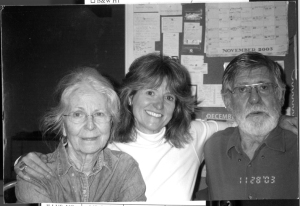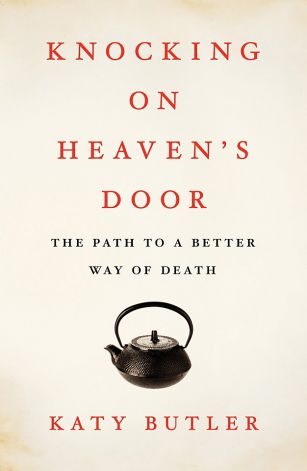This book will hit your heart and mind, hard. Author Katy Butler has written a moving and informative memoir that will stick with you and inspire contemplation. In Knocking on Heaven’s Door: The Path to a Better Way of Death, we intimately go with Katy on her complicated journey of vowing to help her mother get her father’s pacemaker turned off – how she would “learn much about the implications of that vow, about the workings of pacemakers and of human hearts, about the law and medicine and guilt, about money and morality.”
As Butler writes, it’s a true and heartrending story about how her father, mother and she “would become bystanders in a battle, fought over the territory of <her father’s> body, between the ancient reality of death and technological imperatives of modern medicine.”
Readers follow her journey over a period of about eight years, from her father’s stroke to the multitude of health problems that ensued from there; to her relationship with her mother as she tries to support her as primary caregiver; to trying to continue to live her own life with the man she was living with and work as a writer. Throughout this time, we come to understand how and why she “didn’t know what felt worse: abandoning my life or abandoning my parents” and why she continued to try and “alternate between the two.”
We see up close and personal a family that is asking these kinds of moral questions that are not  asked enough in our later years of life: How grateful are we for the gift of life and what are we willing to undergo for more of it? Would we rather die too soon or too late? Does a caregiver’s suffering have a moral standing?
asked enough in our later years of life: How grateful are we for the gift of life and what are we willing to undergo for more of it? Would we rather die too soon or too late? Does a caregiver’s suffering have a moral standing?
Her story makes it glaringly obvious how medical technologies have “helped produce doctors of great technical prowess” but get “limited training in emotional communication, and bring a “lack of cultural consensus about the doctor’s evolving moral role near the end of life.” Like it did with her, this story will make you ask yourself, why at the right time, don’t more doctors ask their patients, “Is your life still worth living?”
Along with her personal story, Butler gives lots of very disturbing stats, such as: “In the last five years of their lives, a quarter of the elderly now spend all of their savings, including the value of their homes, on caregiving and other out-of-pocket medical expenses.” And how about the stats of the medical business, including “how cardiac surgery was so profitable that many hospitals relied on it to subsidize ER and other money-losing depts.” She also lays out scary costs of procedures and medical devices to Medicare, as well as the shocking history of kickbacks from device manufacturers to doctors.
We feel the agony that she and her mother felt as they tried to understand how having legal and even moral rights in an era of advanced medical technology does not mean having “practical power.” Learning about better ways to have more power over our death like “Slow Medicine” and the support of palliative care inspire relief and soul-searching pondering on what we want our own end-of-life to look like. It sure made her mother think about it; what her mother took away from her husband’s path to death deeply influenced how she “died the death she chose” as a result.
Butler ends with a summary of what she wished she would have known at the outset of dealing with her father’s medical issues and his road to death, gives us tangible advice on guiding loved ones through the last phase of life, and presents a great list of topics and questions to use in conversations with loved ones who are near the end of life.
Superbly written, emotional, intelligent, and incisive, Butler helps us navigate a way to a “new art of dying” in a “biotechnical time.” It is a powerful piece on how to live true to one’s death.


This is a heartbreaking topic. One that is applicable to so many of us as our parents surpass the point where they still want to be here. And a topic I think of for myself, for the future. Thanks for sharing your story. I plan to read this.
I learned so much from this book, not only about how to deal with my parents, but my own end of life…